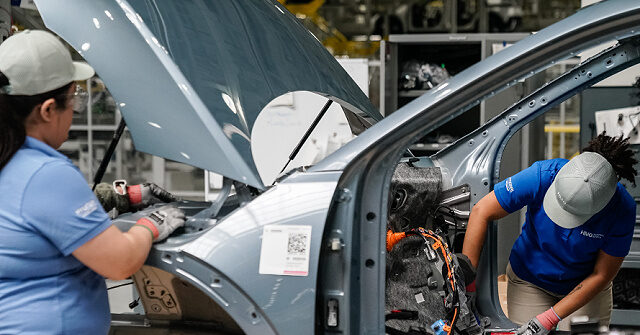U.S. officials will quietly deport the 300 South Korean migrants who were working illegally at a taxpayer-funded construction site in Georgia, muffling a diplomatic spat between the two governments.
The arrests caused a ruckus in Korea and are also being used by U.S. pro-migration groups to argue against the arrest of migrants working in jobs that would otherwise be held by Americans.
But administration officials are promising more sweeps in worksites and in the expanding archipelago of Indian, Chinese, Mexican, Sikh, and Korean economic enclaves throughout the United States.
“These companies that hire illegal aliens, they undercut the competition of paying U.S. citizen salaries,” deportation czar Tom Homan told CNN on Sunday, adding:
Look, no one hires an illegal alien out of the goodness of their heart. They hire them because they can work them harder, pay them less, and undercut the competition that hires U.S. citizen employees. They drive wages down.
And I know this for a fact, my own personal experience of having a roof replaced. I had to call five different companies before I had a company that guaranteed me a legal work force. I talked to one company, just a father and son, who laid off 20 citizen employees because they couldn’t afford — they couldn’t win a bid, because the competition were bidding a lot less for a job because they were paying their employees a lot less to work because they’re illegally in the United States.
The sweep took place at the construction site for the battery factory in Ellabell, Georgia. The factory is being built for two Korean companies: Hyundai Motor Group and LG Energy Solution Ltd. ICE arrested 475 people at the site, including roughly 300 Koreans. The factory is being built with the aid of more than $1 billion in government funds.
The deportations will likely impose a large financial cost on Hyundai because their construction project will be delayed until they can hire — and perhaps train — Americans.
The Korean workers likely passed through U.S. airport customs security by carrying B-1/B-1 tourist/business visitor visas, or with so-called “Electronic System for Travel Authorization” waivers of the normal visa rules.
Foreign companies can get L-1 visas for the specialized employees who are needed to help install exported machines and devices in the United States.
Elite pro-migration advocates — including multiple Democratic legislators and unions — admit, dismiss, and excuse the routine corporate law-breaking that steals money from ordinary Americans.
“Yes, it’s one of those things that has always been technically illegal but virtually never enforced; at least until this admin,” sniffed Aaron Reichlin-Melnick, an advocate at the American Immigration Council. The Koreans were likely “doing some management of the construction … [but] definitely not taking an American job,” said the immigration lawyer.
The arrests will likely deter other countries from investing in the United States, claimed Nathan Ruser, a U.S. university teacher in Korea. “Another example of US strategy being drawn and quartered by ad-hoc policies pulling in different, incoherent directions,” he said.
But Hyundai is a repeat violator of migrant-labor rules and worked within a network of Korean-run companies and staffing firms, as reported by Reuters in 2022:
At least four major suppliers of Hyundai Motor Co and sister Kia Corp have employed child labor at Alabama factories in recent years, a Reuters investigation found, and state and federal agencies are probing whether kids have worked at as many as a half dozen additional manufacturers throughout the automakers’ supply chain in the southern U.S. state.
At a plant owned by Hwashin America Corp, a supplier to the two car brands in the south Alabama town of Greenville, a 14-year-old Guatemalan girl worked this May assembling auto body components, according to interviews with her father and law enforcement officials. At plants owned by Korean auto-parts maker Ajin Industrial Co, in the east Alabama town of Cusseta, a former production engineer told Reuters he worked with at least 10 minors. And six other ex-employees of Ajin said they, too, worked alongside multiple underage laborers.
Corporate executives protect themselves by delegating the law-breaking to disposable staffing companies, including at least one company owned by a Korean-born executive, Reuters noted:
The use of third-party staffing agencies is a common practice among manufacturers and other labor-intensive sectors throughout the United States. The tactic has long been criticized by labor activists because it gives factory owners and other employers the ability to outsource responsibility for the screening, hiring and regulatory compliance of their workforces.
…
Among the children found working at the plant, Reuters learned, were two Guatemalan brothers, aged 13 and 15, who were taken into protective custody by federal authorities. While they worked at SL, the brothers lived without their parents, staying with other factory workers in a sparsely furnished house owned by the president of the staffing agency that hired them, according to property records, family members, and a former coworker interviewed at the home in Alabama.
Korean companies reportedly work their employees very hard.
The Korean government likely understood the problem of illegal Korean migrants in the United States. In 2024, the Korean government lobbied Congress to provide it with special visas to send more Koreans to American jobs.
But the arrests are part of President Donald Trump’s strategy to expand the high-skill, high-productivity sectors in the U.S. economy.
Since his first election in 2016, Trump has deflated the establishment-created, post-1990 bubble of cheap labor. His policies are boosting Americans’ wages, productivity, and high-tech investment, even as they also shrink the U.S. economy’s low-productivity real estate and retail sectors.
“We have to get efficient,” Trump told Breitbart News in August. He added: “We’ll probably add to [the existing workforce] through robotically — it’s going to be robotically … It’s going to be big. Then, somebody is going to have to make the robots. The whole thing, it feeds on itself … we’re going to streamline things.”
Read the full article here
